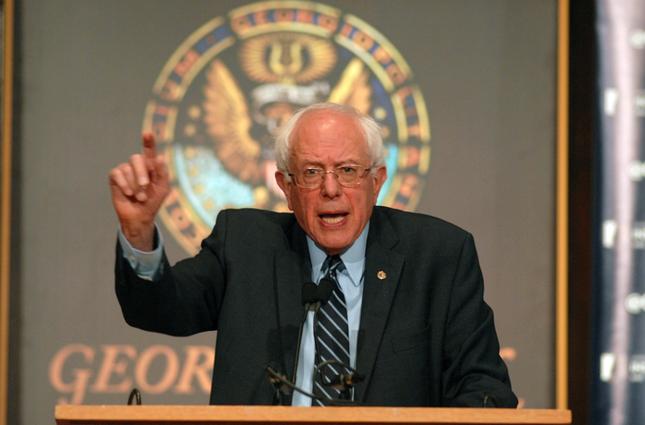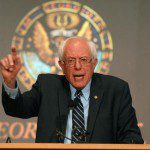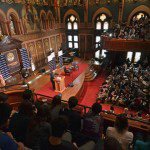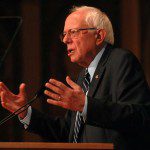Georgetown University Students ‘Feel the Bern’ at Gaston Hall
By • November 30, 2015 0 1897

Democratic presidential contender Senator Bernie Sanders spoke to a packed room at Georgetown University’s Gaston Hall Thursday, Nov. 19, in what was billed as “a talk on democratic socialism in America.” What followed was a reiteration of points Sanders has made throughout his campaign for the presidency about wealth inequality and an explanation of how he would deal with terrorism and the problems plaguing Syria.
Anticipation for Sanders’ was running high at the Jesuit university. Students waited in long lines in the rain to see the independent senator from Vermont, and the excitement only ramped up once they made their way inside Gaston Hall. When Mo Elleithee, the head of the Georgetown Institute of Politics and Public Service, a part of the McCourt School of Public Policy that was established in June, made his way to the stage to commence the program, students whooped and chanted, “Feel the Bern,” a Sanders-derived meme that has almost become slogan to the senator’s supporters.
Sanders received a standing ovation on his way to the podium before beginning his speech by harking back to the times of President Franklin Delano Roosevelt. “He saw tens of millions of its citizens denied the basic necessities of life,” Sanders said before describing mass poverty brought on by the Great Depression. “He saw millions denied education, recreation, and the opportunity to better their lot and the lot of their children. He saw millions lacking the means to buy the products they needed and by their poverty and lack of disposable income denying employment to many other millions. He saw one-third of a nation ill-housed, ill-clad, ill-nourished.”
Sanders continued, describing the steps Roosevelt took to alleviate poverty, like instituting Social Security and Medicare, in the face of critics who called him a socialist. Then, he juxtaposed the past with economic conditions today, particularly inequality, the cost of health care and the hollowing out of the middle class, calling for a combative approach in dealing with what he called, “the ruling class,” one similar to the approach Roosevelt took while he was president. “The billionaire class cannot have it all. Our government belongs to all of us, and not just the one percent,” he said, before quoting Martin Luther King, Jr. in arguing that, “This country has socialism for the rich, and rugged individualism for the poor.”
Returning to Roosevelt, Sanders recited items from the 32nd president’s proposed second Bill of Rights, highlighting, “the right to a decent job at decent pay, the right to adequate food, clothing, and time off from work, the right for every business, large and small, to function in an atmosphere free from unfair competition and domination by monopolies, the right of all Americans to have a decent home and decent health care.”
“We have come to a clear realization of the fact that true individual freedom cannot exist without economic security and independence. Necessitous men are not free men,” Sanders quoted Roosevelt.
Sanders emphasized, “Democratic socialism means that we must create an economy that works for all, not just the very wealthy,” before calling for young people and working people to start a democratic movement that would further the second Bill of Rights and challenge the power of big political donors like Charles and David Koch.
“Democratic socialism means,” Sanders said over and over again as a lead up to expressing support to progressive policy proposals like a $15 minimum wage, universal single-payer health care and paid family leave, which he argued are all popular policies that have not been enacted because a lack of widespread political engagement in the U.S. “It is extremely sad that the United States, one of the oldest democracies on earth, has one of the lowest voter turnouts of any major country, and that millions of young and working class people have given up on our political system entirely,” he said.
Smattered in between the policy proposals, all of which Sanders has raised before, were bits attacking the GOP, Wall Street and industries that profit on fossil fuels. “I believe in private companies that thrive and invest and grow in America instead of shipping jobs and profits overseas. I believe that most Americans can pay lower taxes – if hedge fund managers who make billions manipulating the marketplace finally pay the taxes they should,” he said before expressing his support for the Black Lives Matter movement.
As in his opening statement at the last Democratic debate, Sanders used the tail-end of his G.U. speech to talk how he would deal with the threat ISIS presents to the West. He stressed international cooperation as a key factor in eliminating ISIS, saying, “We must create an organization like NATO to confront the security threats of the 21st century – an organization that emphasizes cooperation and collaboration to defeat the rise of violent extremism and importantly to address the root causes underlying these brutal acts.” He called on “Muslim nations” to lead the regional effort against extremism in Syria and Iraq.
In the end, what was billed as a big speech defining Sanders’ campaign ended up being a long, winding speech, featuring a smorgasbord of past policy proposals and talking points in addition to fresh foreign policy details. This was not the star-quality charisma or soaring rhetoric of President Barack Obama’s campaigns in 2008 and 2012, but Georgetown University students seemed pretty pumped nevertheless.
- Sen. Bernie Sanders at Georgetown University’s Gaston Hall Nov. 19. | Photo by Patrick G. Ryan




